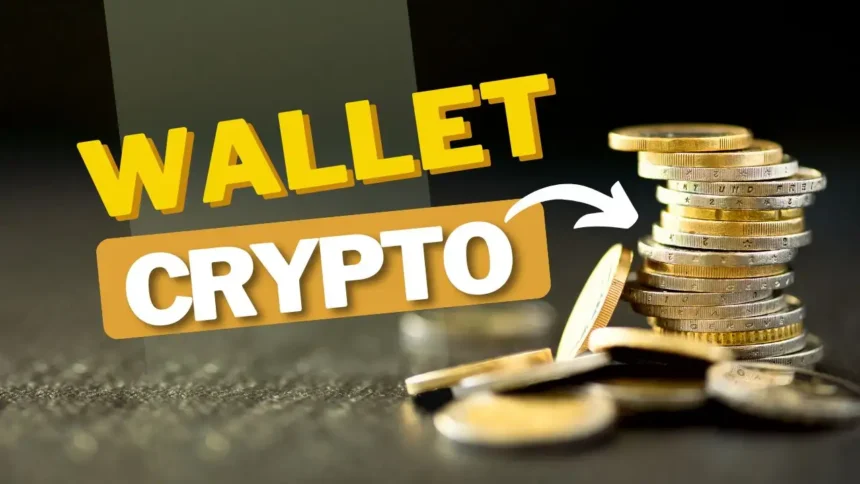The digital era has ushered in a revolution, birthing a new form of currency that transcends borders and traditional financial systems. Cryptocurrencies are now at the forefront of this evolution, and at the heart of this new financial ecosystem lies the crypto wallet—a digital fortress safeguarding your precious assets.

Importance of Crypto Wallets
Think of a crypto wallet as a secure vault, a digital safe that holds your keys to the cryptocurrency kingdom. Without it, managing, transferring, and protecting your digital assets would be akin to wandering through a forest without a map. It’s your gateway to the world of digital currency, ensuring your holdings remain safe from prying eyes and cyber threats.
What is a Crypto Wallet?
Definition and Basic Concept
A crypto wallet is a software program or hardware device that stores your private and public keys, enabling you to send, receive, and monitor your cryptocurrencies. Unlike a traditional wallet that holds physical cash, a crypto wallet doesn’t store the actual coins but rather the keys that grant you access to your digital currency on the blockchain.
Types of Crypto Wallets
Crypto wallets come in various shapes and sizes, each tailored to meet different needs and preferences. From hot wallets connected to the internet to cold wallets that offer offline security, there’s a wallet for every type of user.
How Crypto Wallets Work
Public and Private Keys
At the core of every crypto wallet are two crucial elements: the public key and the private key. The public key is like your bank account number—it’s what you share with others to receive funds. The private key, on the other hand, is your secret password, granting you access to your funds and authorizing transactions. Guarding your private key is paramount, as losing it means losing access to your assets.
The Role of Blockchain
Blockchain technology is the backbone of cryptocurrencies, a decentralized ledger that records all transactions across a network of computers. When you use a crypto wallet, you’re interacting with the blockchain, which ensures transparency, security, and immutability of your transactions.
Types of Crypto Wallets
Hot Wallets
Hot wallets are connected to the internet, making them convenient for frequent transactions but potentially vulnerable to online threats.
Web Wallets
Web wallets are accessible through a browser, offering easy access from any device but requiring robust security measures.
Mobile Wallets
Mobile wallets are smartphone apps that provide on-the-go access to your crypto, perfect for everyday use but dependent on your phone’s security.
Desktop Wallets
Desktop wallets are software programs installed on your computer, providing control over your keys but needing strong antivirus protection.
Cold Wallets
Cold wallets are offline storage solutions, offering enhanced security at the cost of convenience.
Hardware Wallets
Hardware wallets are physical devices that store your keys offline, protected from malware and hacking attempts.
Paper Wallets
Paper wallets involve printing your keys on a piece of paper, ensuring they’re offline but requiring careful handling to avoid loss or damage.
Hot Wallets vs Cold Wallets
Security Comparison
Hot wallets, being online, are more susceptible to cyber-attacks, whereas cold wallets offer robust protection against digital threats.
Usability Comparison
Hot wallets excel in convenience and ease of access, while cold wallets prioritize security, making them ideal for long-term storage.
Setting Up a Crypto Cold Wallet
Choosing the Right Wallet
Selecting the right crypto wallet depends on your needs. Consider factors like security, usability, and the types of cryptocurrencies you plan to store.
Step-by-Step Setup Guide
- Download and Install: Choose your wallet type and download the relevant software or purchase a hardware device.
- Create a New Wallet: Follow the prompts to create a new wallet, setting up a strong password.
- Backup Your Keys: Securely store your private key and recovery phrase in multiple safe locations.
- Start Using: Begin sending and receiving cryptocurrencies, keeping your wallet software up to date.
Securing Your Crypto Wallet
Best Practices for Security
- Use Strong Passwords: Choose complex passwords and change them regularly.
- Enable Two-Factor Authentication: Add an extra layer of security to your wallet.
- Keep Software Updated: Regular updates fix vulnerabilities and improve security.
Common Mistakes to Avoid
- Sharing Private Keys: Never share your private key with anyone.
- Ignoring Backups: Regularly backup your keys and store them securely.
- Using Public Wi-Fi: Avoid accessing your wallet over unsecured networks.
Using Your Crypto Wallet
Sending and Receiving Cryptocurrencies
To send crypto, enter the recipient’s public key, specify the amount, and confirm the transaction. To receive, share your public key with the sender.
Monitoring Transactions
Keep an eye on your wallet for incoming and outgoing transactions, ensuring all activity aligns with your expectations.
Popular Crypto Wallets
Overview of Leading Wallets
- Ledger Nano X: A top-rated hardware wallet known for its security features.
- Trezor: Another popular hardware wallet with a user-friendly interface.
- Exodus: A versatile desktop wallet supporting multiple cryptocurrencies.
- Mycelium: A highly secure mobile wallet for Bitcoin enthusiasts.
Features and Benefits
Each wallet offers unique features, from enhanced security to multi-currency support, catering to different user needs.
Crypto Wallets and Privacy
Anonymity in Crypto Transactions
While blockchain transactions are transparent, your identity can remain anonymous if you take proper precautions.
Protecting Your Identity
Use pseudonyms and privacy-focused coins, and avoid linking your wallet to personal information.
Crypto Wallets for Different Users
Beginners
Simple, user-friendly wallets like Coinbase are ideal for newcomers.
Advanced Users
Experienced users may prefer wallets with advanced features and greater control, like Electrum.
Institutional Users
Institutions often use custodial wallets, offering high security and compliance with regulations.
Future of Crypto Wallets
Innovations on the Horizon
Expect advancements like decentralized finance integration, biometric security, and improved user interfaces.
Potential Challenges
Security threats, regulatory changes, and technological hurdles could impact the future landscape of crypto wallets.
Troubleshooting Common Issues
Lost Keys
Losing your private key means losing access to your funds. Always keep backups in secure locations.
Transaction Errors
Double-check recipient addresses and amounts before confirming transactions to avoid costly mistakes.
Crypto Wallets and Regulations
Compliance and Legal Considerations
Stay informed about regulatory requirements in your jurisdiction to ensure compliance.
Impact of Global Regulations
Regulations vary worldwide, affecting how crypto wallets can be used and the level of privacy they offer.
Conclusion
Crypto wallets are the guardians of your digital wealth, offering security, control, and ease of use. Whether you’re a beginner or an advanced user, choosing the right wallet and following best practices can ensure your cryptocurrency remains safe and accessible. Embrace the future of finance with confidence, knowing your assets are protected within your digital fortress.
FAQ
What happens if I lose my crypto wallet?
Losing your crypto wallet can be devastating if you don’t have backups. Ensure you store your private key and recovery phrase in secure, multiple locations.
Can I have multiple crypto wallets?
Yes, you can have multiple crypto wallets, each serving different purposes or holding different cryptocurrencies.
Are crypto wallets anonymous?
Crypto wallets can offer a degree of anonymity, but true privacy depends on your practices and the type of wallet you use.
How do I choose the best crypto wallet?
Consider factors like security, ease of use, supported currencies, and your specific needs when choosing a crypto wallet.
What is the safest type of crypto wallet?
Cold wallets, such as hardware and paper wallets, are generally considered the safest due to their offline nature.












